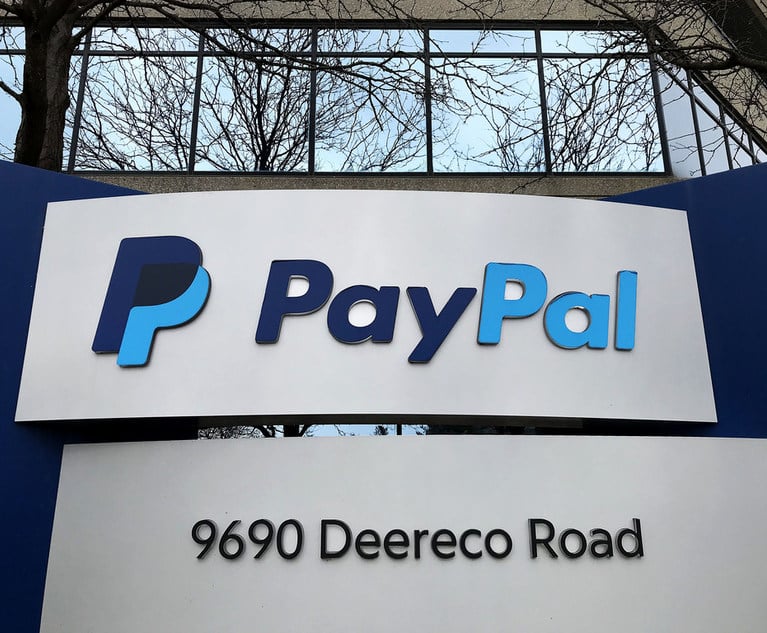Calif. Appeals Court Overturns Ruling Finding Due Process Rights Outweigh Online Privacy
California's First District Court of Appeal passed on the case's constitutional questions, writing that the California Supreme Court is teed up to answer whether barring defendants from obtaining electronic communications truly prevents them from presenting a complete defense.
March 09, 2020 at 10:15 PM
5 minute read
 Facebook-Messenger
Facebook-Messenger
Facebook and Twitter will not be forced to disclose the private messages of a murder victim and witness in a drive-by shooting case spurred, in part, by an online spat, an appeals court ruled.
The social media giants' counsel at Gibson, Dunn & Crutcher and Perkins Coie convinced California's First District Court of Appeal that Derrick Hunter and Lee Sullivan, who were indicted in murder, weapons and gang-related charges, did not meet the good cause standard needed to compel Facebook and Twitter to hand over users' communications.
The court in a decision certified for publication Friday granted the tech companies' motions to quash defendants' subpoenas for the Facebook, Instagram and Twitter accounts of Jaquan Rice, Jr., who was killed in the shooting, and Sullivan's ex-girlfriend turned state's witness Renesha Lee. Rice allegedly threatened to kill Hunter's 14-year-old brother over a reported gang dispute in person and on Facebook and Instagram, according to the opinion. Lee and Sullivan are seeking "[a]ny and all public and private content," to help their case, arguing that their due process and confrontation rights superseded the Stored Communications Act which bars the companies from releasing profile information without explicit consent.
In the opinion originally issued last month, authored by Associate Justice Gordon Burns, the court bypassed the constitutional questions and ruled that Hunter and Sullivan had "not yet presented a ripe conflict between the federal Constitution and the Act." The court found that Hunter and Sullivan had not pursued alternatives that would "avoid a constitutional conflict," such as asking Lee to turn over her account information voluntarily or by court order.
The decision follows similar findings from the California Supreme Court, which remanded the case and asked San Francisco County Superior Court to consider questions such as whether the subpoenaed information was reasonably available, justifiably sought and would violate privacy rights.
"In sum, the trial court did not follow our Supreme Court's instructions to consider all the relevant factors and, instead, appears to have focused solely on Sullivan's justification for discovery," wrote the panel of judges, which also included Presiding Justice Barbara Jones and Associate Justice Mark Simons. "The trial court abused its discretion in finding good cause to order providers to produce private content from Rice's and Lee's accounts for in camera review."
A Twitter spokesperson said in an email that the company is pleased with the court's decision, which has helped clarify the scope of the law's protection to users. "We took a stand against the state court's order in this case because we believed that it violated the federal Stored Communications Act and undermined a key purpose of that law—to protect individuals' privacy rights in electronic communication," the spokesperson said.
Gibson Dunn's Joshua Lipshutz and Michael Holecek and Perkins Coie's James Snell, John Tyler, and Anna Thompson did not immediately return requests for comment at the time of publication.
Last year, San Francisco County Superior Court Judge Charles Crompton denied the platforms' motions to quash, noting Hunter and Sullivan's "very important" Sixth Amendment and due process rights, according to the opinion. The judge said, "I think that these rights are important enough in this particular case, as I've said, given the relevance of electronic messages that's been raised in this particular case, with these particular charges and these particular defendants, it would certainly outweigh any . . . burden [incurred by providers]," the ruling states.
Burns wrote in the decision that the California Supreme court might soon offer clarity on whether barring defendants from obtaining electronic communications truly prevents them from presenting a complete defense in Facebook v. Superior Court (Touchstone). In that case, criminal defendant Lance Touchstone is seeking the social media messages of a shooting victim to help exonerate him in an attempted murder charge. The case has garnered amicus support from Apple and Google.
"Here, however, we need not decide whether it serves as a threshold requirement or just one of several factors to be balanced because, even under a balancing test, we conclude the trial court gave this factor (and others) inadequate attention," Burns ruled.
Sullivan is also hopeful that the California Supreme Court addresses the issue, according to one of his attorney's Bicka Barlow of the Law Office of Bicka Barlow in San Francisco. Barlow said Sullivan's legal team, which also includes San Francisco attorney Susan Kaplan, has already petitioned the state's high court to review the case.
"The Court of Appeal's decision is deeply flawed and created a new legal standard for criminal defendants that has never been applied in any other circumstance in which confidential records are sought," Barlow said in an email. "This legal standard has elevated the burden on a defendant beyond that required to obtain reporters' notes and sensitive material such as medical and psychiatric records. This standard would make social media providers immune from any request from a criminal defendant no matter how compelling the showing of need, denying many their right to defend themselves in the most serious of criminal cases."
Hunter's lawyer, solo practitioner Jose Umali in San Francisco did not respond to a request for comment Monday evening.
This content has been archived. It is available through our partners, LexisNexis® and Bloomberg Law.
To view this content, please continue to their sites.
Not a Lexis Subscriber?
Subscribe Now
Not a Bloomberg Law Subscriber?
Subscribe Now
NOT FOR REPRINT
© 2025 ALM Global, LLC, All Rights Reserved. Request academic re-use from www.copyright.com. All other uses, submit a request to [email protected]. For more information visit Asset & Logo Licensing.
You Might Like
View All
PayPal Faces New Round of Claims; This Time Alleging Its 'Honey' Browser Extension Cheated Consumers

Google Makes Appeal to Overturn Jury Verdict Branding the Play Store as an Illegal Monopoly
5 minute read
Free Microsoft Browser Extension Is Costing Content Creators, Class Action Claims
3 minute read
Law Firms Mentioned
Trending Stories
- 1January Petitions Press High Court on Guns, Birth Certificate Sex Classifications
- 2'A Waste of Your Time': Practice Tips From Judges in the Oakland Federal Courthouse
- 3Judge Extends Tom Girardi's Time in Prison Medical Facility to Feb. 20
- 4Supreme Court Denies Trump's Request to Pause Pending Environmental Cases
- 5‘Blitzkrieg of Lawlessness’: Environmental Lawyers Decry EPA Spending Freeze
Who Got The Work
J. Brugh Lower of Gibbons has entered an appearance for industrial equipment supplier Devco Corporation in a pending trademark infringement lawsuit. The suit, accusing the defendant of selling knock-off Graco products, was filed Dec. 18 in New Jersey District Court by Rivkin Radler on behalf of Graco Inc. and Graco Minnesota. The case, assigned to U.S. District Judge Zahid N. Quraishi, is 3:24-cv-11294, Graco Inc. et al v. Devco Corporation.
Who Got The Work
Rebecca Maller-Stein and Kent A. Yalowitz of Arnold & Porter Kaye Scholer have entered their appearances for Hanaco Venture Capital and its executives, Lior Prosor and David Frankel, in a pending securities lawsuit. The action, filed on Dec. 24 in New York Southern District Court by Zell, Aron & Co. on behalf of Goldeneye Advisors, accuses the defendants of negligently and fraudulently managing the plaintiff's $1 million investment. The case, assigned to U.S. District Judge Vernon S. Broderick, is 1:24-cv-09918, Goldeneye Advisors, LLC v. Hanaco Venture Capital, Ltd. et al.
Who Got The Work
Attorneys from A&O Shearman has stepped in as defense counsel for Toronto-Dominion Bank and other defendants in a pending securities class action. The suit, filed Dec. 11 in New York Southern District Court by Bleichmar Fonti & Auld, accuses the defendants of concealing the bank's 'pervasive' deficiencies in regards to its compliance with the Bank Secrecy Act and the quality of its anti-money laundering controls. The case, assigned to U.S. District Judge Arun Subramanian, is 1:24-cv-09445, Gonzalez v. The Toronto-Dominion Bank et al.
Who Got The Work
Crown Castle International, a Pennsylvania company providing shared communications infrastructure, has turned to Luke D. Wolf of Gordon Rees Scully Mansukhani to fend off a pending breach-of-contract lawsuit. The court action, filed Nov. 25 in Michigan Eastern District Court by Hooper Hathaway PC on behalf of The Town Residences LLC, accuses Crown Castle of failing to transfer approximately $30,000 in utility payments from T-Mobile in breach of a roof-top lease and assignment agreement. The case, assigned to U.S. District Judge Susan K. Declercq, is 2:24-cv-13131, The Town Residences LLC v. T-Mobile US, Inc. et al.
Who Got The Work
Wilfred P. Coronato and Daniel M. Schwartz of McCarter & English have stepped in as defense counsel to Electrolux Home Products Inc. in a pending product liability lawsuit. The court action, filed Nov. 26 in New York Eastern District Court by Poulos Lopiccolo PC and Nagel Rice LLP on behalf of David Stern, alleges that the defendant's refrigerators’ drawers and shelving repeatedly break and fall apart within months after purchase. The case, assigned to U.S. District Judge Joan M. Azrack, is 2:24-cv-08204, Stern v. Electrolux Home Products, Inc.
Featured Firms
Law Offices of Gary Martin Hays & Associates, P.C.
(470) 294-1674
Law Offices of Mark E. Salomone
(857) 444-6468
Smith & Hassler
(713) 739-1250






